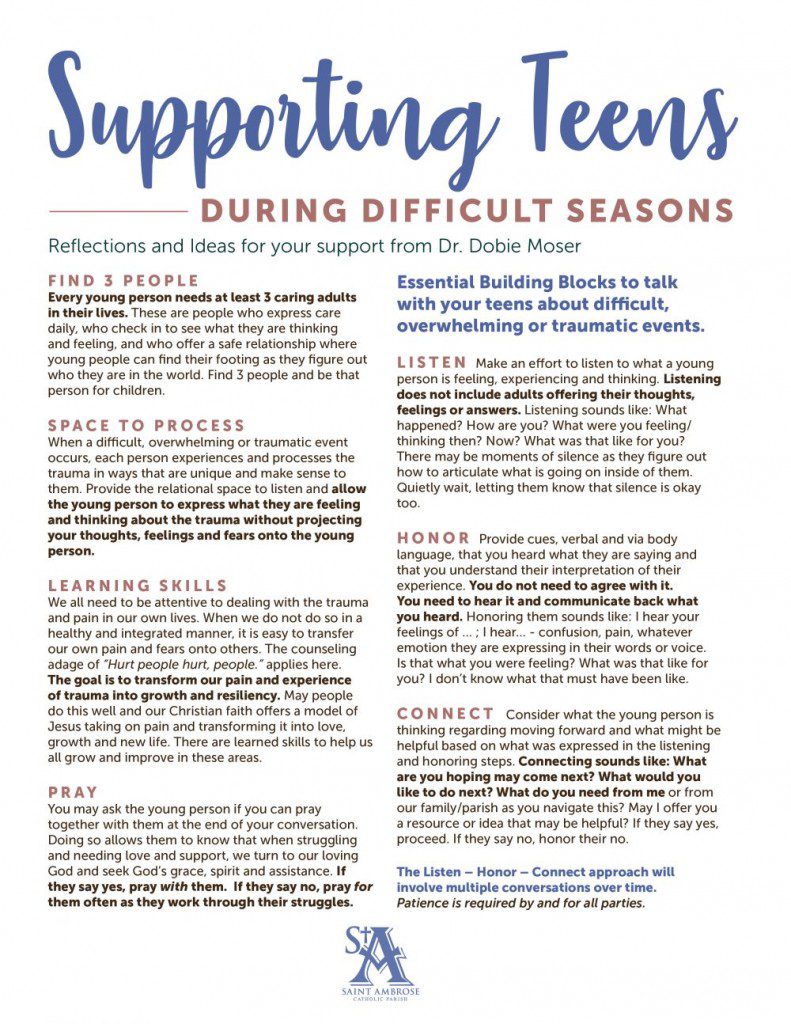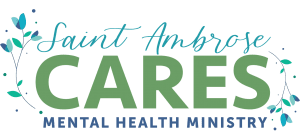Springtide Research Presentation
Date: October 12, 2023 | Topic: Teens’ and Young Adults’ Mental Health
Saint Ambrose Catholic Community is committed to serving those in need with a compassionate heart. Our Mental Health Ministry (MHM) works together to offer support, education and a network of resources for individuals and families dealing with mental health challenges. We aim to be a learning community that will increase our knowledge and understanding of mental illness and how best to respond with the care and compassion of Christ.
Many people are suffering and struggling, often silently. They need help…mostly…they need HOPE.
How we can CARE:
• learn how to ask the right/tough questions
• understand warning signs
• know what to look for among family and friends
• learn how to get help for those we love
NAMI at Saint Ambrose
We’re joining the NAMI ( National Alliance on Mental Illness) Walks Greater Cleveland for the second time and hoping to surpass the $2,500 they raised last year with almost 100 walkers! Walk with the Saint Ambrose Mental Health Ministry team at the NAMI Walk from 9:00 am to noon on Saturday, September 23 at Edgewater Park in Cleveland, Ohio. To join our team or to donate to our team, click/tap the button below , or email Jennie Porco or call her at 330.460.7317.
Four Courageous Conversations
May is Mental Health Awareness Month
We’ve teamed up with Dr. Edgardo Padin-Rivera and Dr. Dobie Moser to bring you a series of 4 videos sponsored by the Saint Ambrose Mental Health Ministry.
1. Understanding Mental Illness
It is important to understand mental illness, anxiety, depression, and serious mental illness.
2. Adolescents and Mental Health
Filled with many challenges and opportunities, adolescence is the most crucial time for mental health development as teens go through major changes that set a course for their adulthood.
3. Serious Mental Illness
Requires professional intervention and support for the person with the illness and for their families and caregivers.
4. Mental Health: from Helplessness to Hopefulness
Many of us never imagined that mental illness and challenges would be part of our story. Yet, it happens all the time and we need to know how to live with hope as we work through life’s challenges.
Mental Health Resources
Do you need help?
You are not alone. We are here to help.
Please call 330-460-7300 to speak to a priest at our Parish. You may also email FrBob@StAmbrose.us.
During Mental Illness Awareness Week, MHA will focus on sharing information about 7 major mental health conditions:
- Anxiety
- Bipolar Disorder
- Psychosis
- Eating Disorders
- Depression (On October 10 to coincide with World Mental Health Day and National Depression Screening Day)
- PTSD
- Addiction/Substance Use Disorder
Take a mental health screen and encourage others to try. Each of the conditions mentioned above also coincides with a mental health screen, and each condition-specific fact you share can direct people to screening at mhascreening.org.
ADAMH Board Resources
The Medina County Alcohol, Drug Addiction & Mental Health Board

The Medina County Alcohol, Drug Addiction & Mental Health (ADAMH) Board funds a system of providers to administer high quality behavioral health services through a continuum of care that includes options for mental health and substance abuse treatment, prevention services and recovery supports.
Additionally, the ADAMH Board works to reduce the stigma of mental health and addiction concerns through collaboration, prevention, education and advocacy efforts.
Additional local resource information can be found at www.medinamentalhealth.com.
If you are in need of support, contact the 24/7 Crisis and Behavioral Health Helpline at 330-725-9195.
246 Northland Drive • Medina, Ohio 44256 • 330-723-9642 • Fax: 330-723-9643
National Suicide Prevention Lifeline
1-800-273-8255
We can all help prevent suicide. The Lifeline provides 24/7, free and confidential support for people in distress, prevention and crisis resources for you or your loved ones, and best practices for professionals.
Resources and Articles



